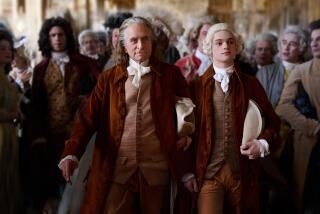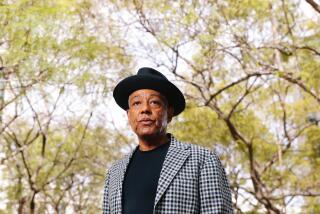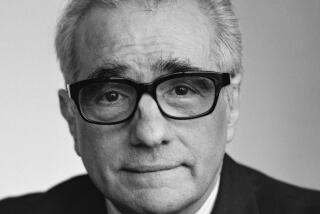The Sunday Conversation: Jeremy Irons digs in to ‘Borgias’ darkness
Jeremy Irons stars as the ruthless Rodrigo Borgia, who became Pope Alexander VI, in Showtime’s period drama”The Borgias,” now in its second season.
You really seem like you’re having fun with this role.
I’m glad about that. I’ve always believed that in the theater or movies, whatever, the audience’s enjoyment is increased if the actors seem to be enjoying what they’re doing.
What’s fun about the Borgia pope?
The great thing about doing series television is you have time. I’ve had now 19 or 20 hours to explore this character, and that means that Neil Jordan, the writer, can write a character that has inconsistencies, that has enigmatic qualities that you wouldn’t be able to explore in the shortened period of a film. So it’s great fun to play all the contradictions, which most real-life people have and certainly Pope Alexander had.
Do you prefer television?
No, I don’t prefer television, but it does allow you to work in a certain way that film sometimes doesn’t because film only has 11/2 to 2 hours to tell a story. And quite honestly, we could be making film with “The Borgias.” The process is exactly the same, the standards are exactly the same, if not higher in some cases.
What I prefer is to work on a character who interests me and a story that is a good story with good backup, and that could be in theater, it could be film, it could be television. The medium in a way doesn’t matter.
How does your character compare to our understanding of the Borgia pope?
I think he’s pretty accurate. Facts are very difficult to get. And we’re talking about 600 years ago when there was no reportage. What comes down to us is, most of it is the propaganda of the succeeding pope. He tried to completely ruin his reputation, so a lot that comes down to us is spin on that. [Pope Alexander] was, however, a man very different from how we would imagine a modern-day pope, but then life was different and politics were different and the whole power structure within Europe was different, the position of the Catholic Church was different. But that aside, there are huge parallels with today; sometimes I think the Vatican then was not that different from Washington now. The Vatican then was a political and military power with the monarch being the pope, and he was much more of a monarch and a pope than the present pope, who isn’t a monarch at all.
He does seem to be pious. How did he reconcile that with murder?
You could ask the same question ofGeorge [W.] Bushreally, who would say he’s a Christian man and yet who killed many civilians in Iraq for pragmatic reasons.
Can’t you make the distinction between war and murder?
I don’t believe you can. When you are protecting interests outside your country, then I’m not sure there’s a great difference actually. I think it’s dressed up in different words. You are subjecting people, killing them if you like, for your own reasons pragmatically, whether it be to create influence or to protect power lines or oil lines or whatever.
And this season is even darker?
I don’t know if it’s darker. The first season we laid out the world and the second season it begins to move. The pope I think you see him moving but also trying to mold his children into what he wants them to be, what will be useful. There’s no doubt that Pope Alexander dreamt of the papacy becoming hereditary and of uniting as much of Italy as he could, Northern Italy, anyway. Which is not so odd. Most kings are succeeded by their children, and that’s what he was trying to do
Were you pleased when your sons decided to become actors?
They didn’t both. My elder son [Samuel] is a photographer. He acted when he was very young. He acted in a movie with me when he was 10 and did a stage play with me when he was 6, which was perhaps a misguided decision on my part in that he was aware of what I call the bull surrounding my profession and I wanted him to be aware of the real nature of it, and I thought that if he was able to experience that, he would understand the importance or not of what surrounded me, the fame, etc., etc., celebrity-ness. By his admission, that probably put him off being an actor.
But Max has hung in there.
I think he was 15 or 16 before he did his first film, and it was a tiny part and nobody knew who he was. But his passion was always to do it, so you can only wish your children joy when they have a passion to do something.
You have voiced concern over the way the industry uses up pretty young people and spits them out.
Yes, I think it’s a problem. I was lucky enough to have my first 10 years as an actor working in theater, where I could learn and grow and practice and fail and it did not matter too much. I think when you’re starting out and it’s very public — he’s now on his third film — in order to grow as an actor, you need to allow yourself the permission to fail. And you can do that in theater and you can risk in a certain way which will make you grow, if you allow yourself that permission. When you’re working in a movie that has a big budget, an awful lot of people are very keen you shouldn’t fail, so it’s a much harder route.
I’ve read that you have seven homes in England and Ireland. Is that right?
I have seven buildings that I have something to do with, yes. Other people live in them, other family members and things.
I was going to ask how it worked. You don’t rotate among seven homes?
No, I rotate among three homes.
You must be much better organized than I am.
It’s tough, isn’t it? The thing you want is always in the other one. It is tough, and I have a bit of help, but if you’re a person who likes to live a private life, who has certain needs — in other words, I have to be in London sometimes; I have to be in England sometimes — but when I have time off I go to Ireland where my horses are and I can really chill and relax.
More to Read
The biggest entertainment stories
Get our big stories about Hollywood, film, television, music, arts, culture and more right in your inbox as soon as they publish.
You may occasionally receive promotional content from the Los Angeles Times.






